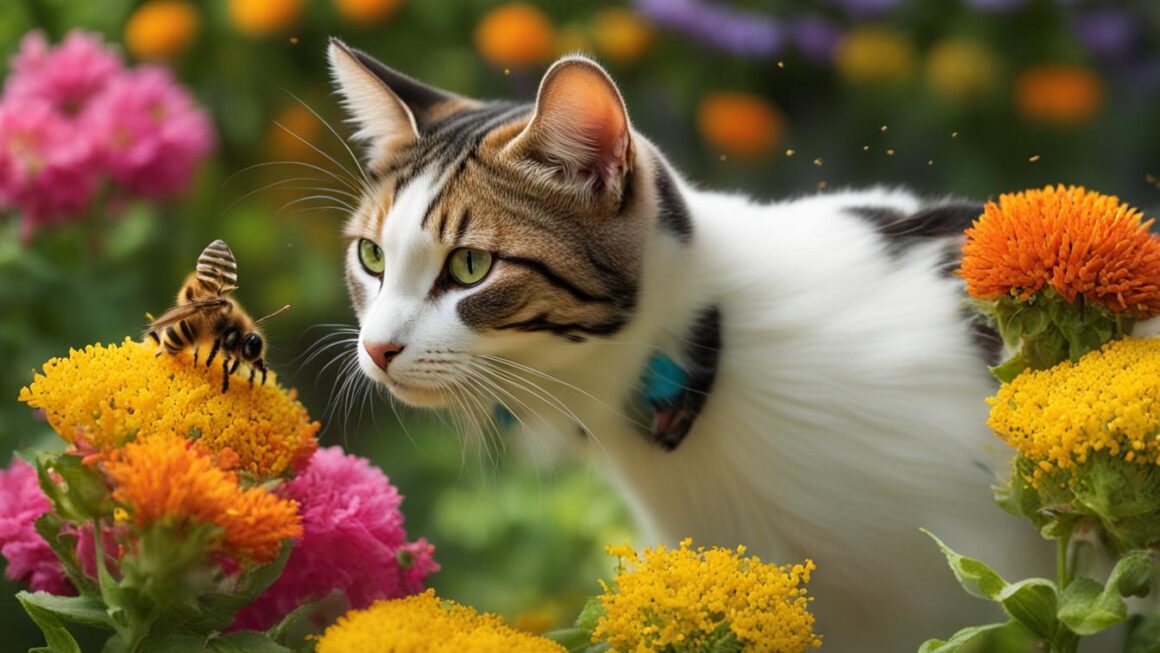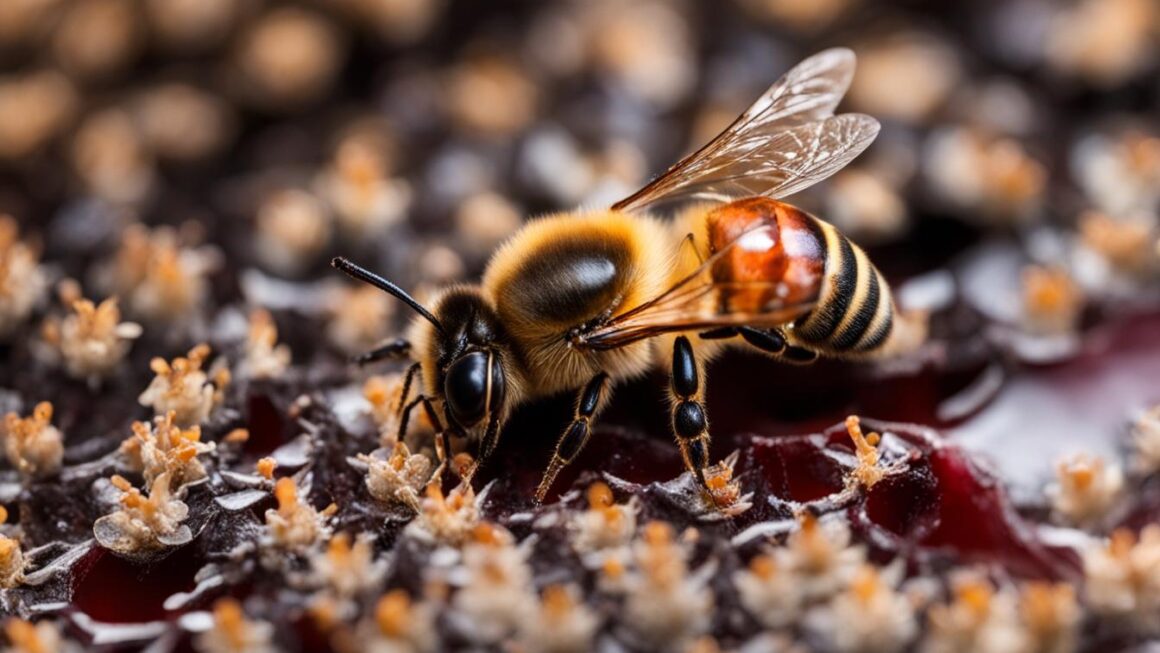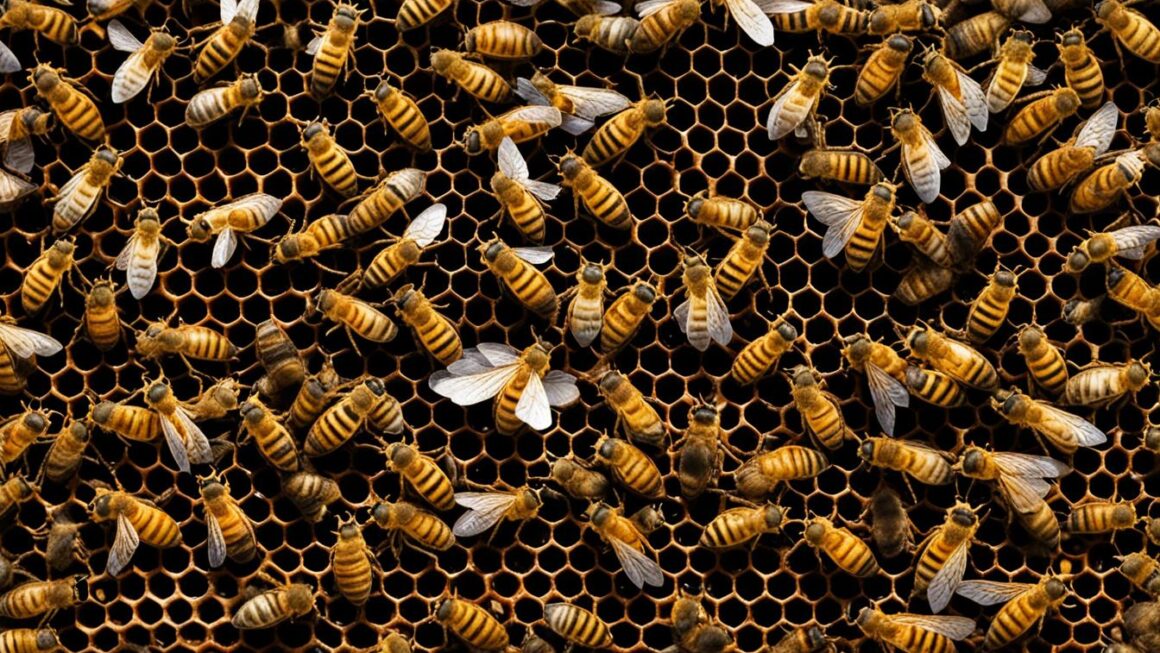Bee Pollen is a highly nutritious supplement that contains vitamins, minerals, trace elements, enzymes, and amino acids. It is known to boost the immune system, provide energy, and act as an antioxidant. Bee Pollen can potentially have various benefits for cats.
Key Takeaways:
- Bee Pollen is a nutritious supplement for cats.
- It contains vitamins, minerals, and other beneficial compounds.
- Bee Pollen can boost the immune system and provide energy.
- Cats can potentially experience various health benefits from Bee Pollen.
- Consult a veterinarian before introducing Bee Pollen to your cat’s diet.
The Nutritional Composition of Bee Pollen
Bee Pollen is a natural superfood that packs a nutritional punch for both humans and animals, including cats. It contains a diverse range of nutrients that can provide several potential benefits for feline health and well-being. Let’s explore the nutritional composition of Bee Pollen and how it can contribute to the overall health of cats.
When it comes to the nutritional content, Bee Pollen is a powerhouse. It is composed of approximately 35% protein, making it a valuable source of amino acids essential for the growth and maintenance of a cat’s body. Additionally, Bee Pollen is rich in carbohydrates, providing fuel for energy and supporting metabolic functions.
But that’s not all. Bee Pollen is also packed with essential vitamins and minerals. It contains high levels of B-complex vitamins, which play a crucial role in maintaining a cat’s overall health, including their immune system and nervous system. Vitamin A, C, D, and E are also present in Bee Pollen, providing antioxidant properties and supporting various bodily functions.
| Nutrient | Percentage |
|---|---|
| Protein | 35% |
| Carbohydrate | 55% |
| Fatty Acids | 2% |
| Minerals and Vitamins | 3% |
Table: Nutritional Composition of Bee Pollen for Cats
Bee Pollen also contains essential fatty acids, such as omega-3 and omega-6, which play a vital role in maintaining a cat’s healthy coat and skin. In addition, it is a natural source of minerals like selenium, which supports immune function, and iron, which aids in the production of red blood cells.
In summary, Bee Pollen is a nutritional powerhouse for cats. Its high protein and carbohydrate content, along with its rich vitamins and minerals, make it a valuable addition to a cat’s diet, potentially providing various health benefits. However, it’s essential to introduce Bee Pollen gradually and consult with a veterinarian to ensure its safety and suitability for individual cats.
Potential Benefits for Cats
Bee Pollen may have several potential benefits for cats. It is known to boost the immune system, enhance vitality, counteract the effects of chemical toxins, relieve allergies, aid in weight maintenance, assist with the digestive process, and promote healing. It can also improve skin conditions and strengthen the respiratory system.
Boosting the Immune System
Bee Pollen contains a wide range of nutrients, including vitamins, minerals, and amino acids, that can help strengthen a cat’s immune system. These nutrients support the body’s natural defenses and help protect against illnesses and infections.
Relieving Allergies
Contrary to what you may think, bee pollen has been shown to reduce allergic reactions in some cats. It works by desensitizing the cat’s immune system to common allergens, such as pollen, dust mites, and certain foods. This can provide relief from symptoms like itching, sneezing, and watery eyes.
Promoting Digestive Health
Bee Pollen contains enzymes that can aid in the digestion of food. This can be particularly beneficial for cats with sensitive stomachs or digestive issues. It helps break down food more efficiently, allowing for better nutrient absorption and improved overall digestion.
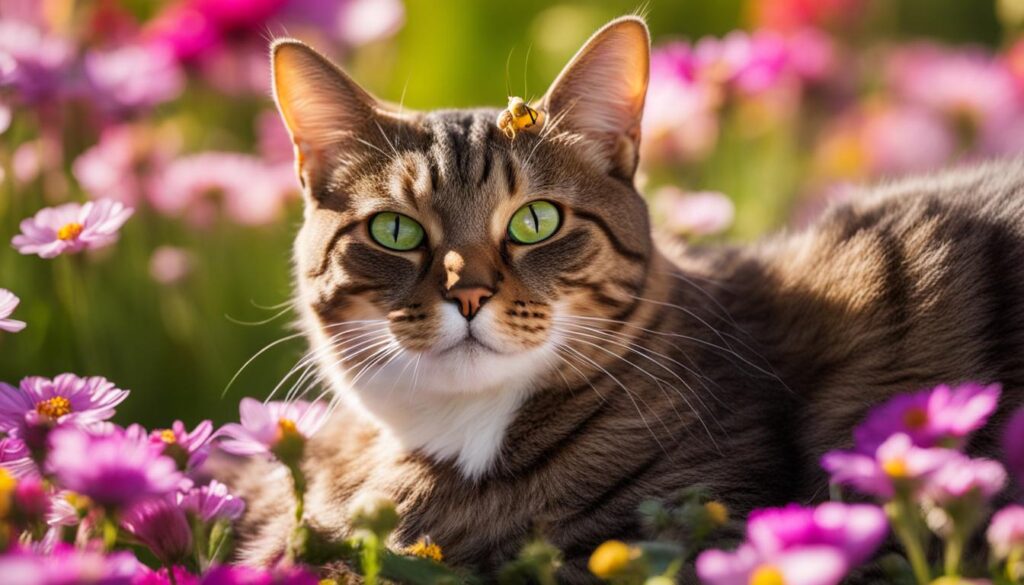
Recommended Dosage for Cats
When it comes to giving bee pollen to cats, it’s crucial to follow the recommended dosage to ensure their safety and well-being. The dosage can vary depending on the cat’s size, weight, and overall health. It is recommended to start with a smaller amount and gradually increase it over a week to allow the cat’s body to adjust to the supplement.
Table 1: Recommended Dosage for Cats
| Cat Size | Recommended Dosage |
|---|---|
| Small (less than 5 lbs) | 1/8 teaspoon |
| Medium (5-10 lbs) | 1/4 teaspoon |
| Large (over 10 lbs) | 1/2 teaspoon |
In times of stress, illness, or recovery from surgery, the dosage can be slightly increased to support the cat’s immune system and overall well-being. However, it’s important to consult with a veterinarian before making any changes to the dosage.
It’s crucial to monitor the cat closely after introducing bee pollen and watch out for any signs of allergic reactions or adverse effects. If any such reactions occur, it is advised to discontinue the use of bee pollen and seek veterinary advice.
Potential Risks and Allergic Reactions
Cats are generally considered to be more sensitive to various substances than humans, and bee pollen is no exception. While bee pollen is believed to be safe for cats when consumed in moderation, there is a potential risk of allergic reactions. Some cats may have pollen allergies and may experience adverse symptoms after consuming bee pollen. It is important to monitor cats closely after introducing bee pollen into their diet and discontinue its use if any signs of an allergic reaction occur.
Common symptoms of an allergic reaction in cats may include skin rashes, itching, digestive upset such as vomiting or diarrhea, respiratory issues like coughing or wheezing, and behavioral changes. If you observe any of these symptoms after your cat consumes bee pollen, it is recommended to seek veterinary assistance immediately.
It’s important to note that while bee pollen can provide potential benefits for cats, it is not a necessary component of their diet. If you are concerned about the potential risks or if your cat has a history of allergies, it is always best to consult with a veterinarian before introducing bee pollen or any new supplement into your cat’s diet. They can provide guidance based on your cat’s individual needs and health condition.
“While bee pollen can be a great source of nutrition for cats, it’s important to remember that every cat is unique. Some cats may tolerate bee pollen well, while others may have allergic reactions. It’s always best to monitor your cat closely and seek veterinary advice if you suspect any adverse reactions. Safety should always be the top priority when considering any new addition to your pet’s diet.”
| Allergic Reactions to Bee Pollen in Cats | Risks of Bee Pollen for Cats |
|---|---|
| Adverse skin reactions, such as rashes and itching | Potential allergies in cats with pollen sensitivities |
| Respiratory issues, including coughing and wheezing | Digestive upset, such as vomiting or diarrhea |
| Behavioral changes | Potential interactions with existing medications |
Storage and Shelf Life
Bee Pollen, like any other natural product, requires proper storage to maintain its quality and effectiveness. Here are some guidelines to ensure the longevity of your Bee Pollen:
- Store in a cool, dark place: Bee Pollen should be kept away from direct sunlight, heat, and moisture. A pantry or a cabinet away from the stove or any other heat source is ideal.
- Refrigeration: If you live in a particularly hot climate, storing Bee Pollen in the refrigerator can help preserve its freshness. However, it is not necessary for short-term storage.
- Freshness matters: Bee Pollen is best consumed when fresh. It is recommended to purchase smaller quantities to ensure you’re using it within a reasonable timeframe.
In terms of shelf life, Bee Pollen typically has a long expiration date if stored correctly. It is important to check the packaging or consult with the seller for specific information. However, as a general rule, Bee Pollen should be consumed within 12 months from opening the container.
| Storage Tips for Bee Pollen | Shelf Life |
|---|---|
| Store in a cool, dark place | Up to 12 months |
| Refrigerate in hot climates | Check packaging or consult seller |
| Use fresh Bee Pollen |
Following these storage guidelines will help maintain the quality and potency of your Bee Pollen, ensuring that your feline companion can continue to reap its potential benefits.
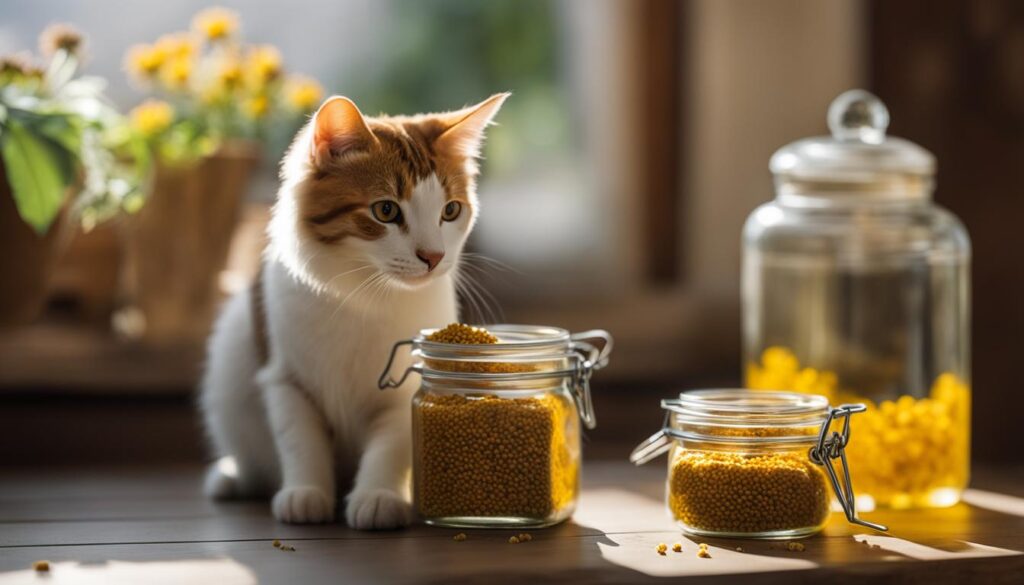
Integrating Bee Pollen into a Cat’s Diet
Bee Pollen can be a beneficial addition to a cat’s diet, offering potential health benefits. When integrating Bee Pollen into a cat’s diet, it’s important to start with a small amount and gradually increase it to the recommended dosage. This allows the cat’s digestive system to adjust to the new supplement. Bee Pollen can be sprinkled over a cat’s meal daily for easy integration. It can also be mixed with plain organic yogurt or added to their food cups. This ensures that the cat consumes the Bee Pollen without any fuss.
Adding Bee Pollen to a cat’s diet can provide them with a boost of nutrients. It is essential to choose high-quality Bee Pollen from reputable sources. Reading product reviews and consulting with veterinarians or experienced pet owners can help in finding reliable sources for Bee Pollen. Additionally, it is important to note that Bee Pollen should not be used as a replacement for a balanced diet and should be given in moderation.
Benefits of Integrating Bee Pollen into a Cat’s Diet:
- Boosts the immune system
- Enhances vitality
- Relieves allergies
- Assists with the digestive process
- Promotes healing
- Improves skin conditions
- Strengthens the respiratory system
By incorporating Bee Pollen into a cat’s diet, owners may potentially see improvements in their cat’s overall health and well-being. However, it is crucial to monitor the cat closely for any adverse reactions and discontinue use if necessary. Consulting with a veterinarian before introducing Bee Pollen is recommended, especially for cats with existing health conditions or allergies.
Other Considerations and Precautions
When considering the use of bee pollen for cats, there are a few important factors to keep in mind to ensure the safety and well-being of your feline friend. While bee pollen is generally considered safe, it should not be used as a replacement for a balanced diet. It should be given in moderation and as a supplement to support your cat’s overall nutrition.
It is crucial to closely monitor your cat for any adverse reactions after introducing bee pollen into their diet. Although rare, allergic reactions can occur, especially in cats with pre-existing pollen allergies. If you notice any signs of an allergic reaction, such as itching, swelling, or difficulty breathing, discontinue the use of bee pollen and consult with a veterinarian.
Before incorporating bee pollen into your cat’s diet, it is always best to consult with a veterinarian. They can provide guidance specific to your cat’s individual needs and health conditions. This is especially important if your cat has any underlying health conditions or takes medications that may interact with bee pollen.
Overall, when used responsibly and under the guidance of a veterinarian, bee pollen can be a beneficial addition to your cat’s diet. By taking these considerations and precautions into account, you can ensure that your cat can safely enjoy the potential benefits that bee pollen may offer.
Bee Pollen for Dogs and Other Animals
Bee Pollen is not only beneficial for cats but also for dogs and other animals. Similar to cats, dogs can potentially experience various health benefits from consuming Bee Pollen. It is important to note that the dosage and introduction should be done under the guidance of a veterinarian for each individual animal.
The nutritional composition of Bee Pollen, including its high protein content, vitamins, and minerals, can provide valuable support to dogs’ overall health and well-being. Bee Pollen may boost the immune system, provide energy, aid in digestion, and promote healing.
When integrating Bee Pollen into a dog’s diet, it is recommended to start with a small amount and gradually increase it over time. It can be sprinkled over their meal or mixed with their food cups. As with cats, it is crucial to monitor dogs closely after introducing Bee Pollen and discontinue use if any signs of an allergic reaction occur.
Aside from cats and dogs, Bee Pollen can also be beneficial for other animals. However, it is always important to consult with a veterinarian to ensure the safety and suitability of Bee Pollen for each specific animal. The expert opinion of a holistic veterinarian, such as Dr. Jill Tack, can provide valuable insights and guidance when considering Bee Pollen for dogs and other animals.
Expert Opinion on Bee Pollen for Cats
Dr. Jill Tack, a holistic veterinarian, has extensive experience with the use of Bee Pollen for cats. She believes that Bee Pollen is a powerful multivitamin and whole food that can support overall health and well-being in feline companions. According to Dr. Tack, Bee Pollen contains a wide range of essential nutrients, including vitamins, minerals, enzymes, and amino acids, making it an excellent dietary supplement for cats.
Dr. Tack emphasizes that Bee Pollen should be considered as a daily tonic for cats. It can provide them with an extra boost of energy and vitality, enhance their immune system, and contribute to their overall well-being. She suggests incorporating Bee Pollen into a cat’s diet regularly to maximize its potential benefits.
“Bee Pollen is a natural and nutritionally-rich supplement that can play a valuable role in supporting the health of cats. It possesses potent antioxidant properties, aids in digestion, and can alleviate allergies. Additionally, Bee Pollen can enhance skin conditions and strengthen the respiratory system in cats,”
states Dr. Tack.
As a holistic veterinarian, Dr. Tack believes in the power of natural remedies and whole foods to promote optimal health in animals. She recommends Bee Pollen as a safe and effective option for cats, provided it is used in moderation and in accordance with the recommended dosage guidelines.
Integrating Bee Pollen into a cat’s diet can be an excellent way to enhance their nutritional intake and support their overall well-being. However, it is always important to consult with a veterinarian before introducing any new supplement or dietary change to a cat’s routine, especially if they have existing health conditions or allergies.
Where to Find Bee Pollen for Cats
When it comes to providing bee pollen for your cats, it’s important to find a reliable source that offers high-quality products without any preservatives, additives, or artificial colors and flavors. You can find bee pollen specifically made for cats in pet specialty stores or online markets. Here are some tips to help you choose the right source:
- Reputation: Look for a reputable brand or seller with positive reviews and feedback from other pet owners. This can give you confidence in the quality of the bee pollen they offer.
- Quality Assurance: Ensure that the bee pollen is sourced from reputable and reliable beekeepers who follow strict quality control measures. It’s best to choose organic bee pollen to avoid any potential exposure to pesticides or other harmful substances.
- Product Information: Check the product information provided by the brand or seller. Look for details on how the bee pollen is processed, stored, and packaged to ensure its freshness and effectiveness.
- Consult with Veterinarians or Experienced Pet Owners: If you’re unsure about which brand or seller to choose, consider seeking advice from veterinarians or experienced pet owners who have used bee pollen for their cats. They can provide valuable insights and recommendations based on their own experiences.
Remember, introducing any new supplement or food to your cat’s diet should be done gradually and with caution. Monitor your cat closely for any adverse reactions and discontinue use if necessary. It’s always a good idea to consult with a veterinarian before introducing bee pollen or any other dietary supplement to your cat, especially if they have any existing health conditions or allergies.
By following these guidelines and finding a reliable source of bee pollen, you can provide your cats with the potential benefits of this nutritious supplement and support their overall health and well-being.
Conclusion
In conclusion, Bee Pollen can potentially be a valuable addition to a cat’s diet, providing various potential benefits. Its nutritional composition, rich in vitamins, minerals, and antioxidants, can support the immune system, enhance vitality, and promote overall health. However, it is important to introduce Bee Pollen gradually and monitor cats for any adverse reactions.
While Bee Pollen is generally considered safe for cats, there is a potential risk of allergic reactions, especially in cats with pollen allergies. It is crucial to discontinue use if any signs of an allergic reaction occur. Additionally, Bee Pollen should not be used as a replacement for a balanced diet and should be given in moderation.
Consulting with a veterinarian before introducing Bee Pollen is recommended, especially for cats with existing health conditions or allergies. They can provide guidance on the appropriate dosage and ensure the safety and suitability of Bee Pollen for each individual cat. Overall, when used responsibly, Bee Pollen can contribute to the overall health and well-being of cats.
FAQ
Can cats consume bee pollen?
Yes, cats can consume bee pollen. Bee pollen has various potential benefits for cats, but it is important to introduce it gradually and monitor for any adverse reactions.
Is bee pollen safe for cats?
Bee pollen is generally considered safe for cats. However, there is a potential risk of allergic reactions, especially for cats with pollen allergies. It is important to monitor cats closely after introducing bee pollen and discontinue use if any signs of an allergic reaction occur.
What are the potential benefits of bee pollen for cats?
Bee pollen may boost the immune system, enhance vitality, relieve allergies, aid in weight maintenance, assist with the digestive process, promote healing, improve skin conditions, and strengthen the respiratory system in cats.
What is the recommended dosage of bee pollen for cats?
The recommended dosage of bee pollen for cats is up to ¼ teaspoon. It is advised to start with a smaller amount and gradually increase it over a week. The dosage can be slightly increased in times of stress, illness, or recovery from surgery.
Are there any potential risks or allergic reactions to bee pollen in cats?
While bee pollen is generally safe for cats, there is a potential risk of allergic reactions. Cats with pollen allergies may experience adverse symptoms. It is important to monitor cats closely after introducing bee pollen and discontinue use if any signs of an allergic reaction occur.
How should bee pollen be stored and what is its shelf life?
Bee pollen should be stored in a cool, dark place or in the refrigerator. It is best used when fresh and should be consumed within 12 months from opening to maintain its quality and effectiveness.
How can bee pollen be integrated into a cat’s diet?
Bee pollen can be sprinkled over a cat’s meal daily for easy integration into their diet. It can also be mixed with plain organic yogurt or added to their food cups. It is important to start with a small amount and gradually increase it to the recommended dosage.
What other considerations and precautions should be taken when giving bee pollen to cats?
Bee pollen should not be used as a replacement for a balanced diet and should be given in moderation. It is important to monitor cats for any adverse reactions and discontinue use if necessary. Consulting with a veterinarian before introducing bee pollen is recommended, especially for cats with existing health conditions or allergies.
Can bee pollen be given to other animals, such as dogs?
Yes, bee pollen can be given to other animals, including dogs. It can provide similar potential benefits and be integrated into their diet following the appropriate dosage guidelines. However, it is important to consult with a veterinarian to ensure its safety and suitability for each individual animal.
What do experts say about bee pollen for cats?
Dr. Jill Tack, a holistic veterinarian, praises the nutritional benefits of bee pollen for cats. She considers it a powerful multivitamin and whole food that can support overall health and well-being. She recommends bee pollen as a daily tonic and a supplement to enhance the health of cats and other animals.
Where can bee pollen for cats be found?
Bee pollen for cats can be found in pet specialty stores or online markets. It is important to choose a reputable source that offers high-quality bee pollen without preservatives, additives, or artificial colors and flavors. Reading product reviews and consulting with veterinarians or experienced pet owners can help in finding a reliable source of bee pollen.

